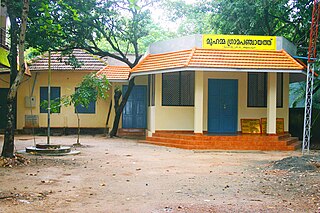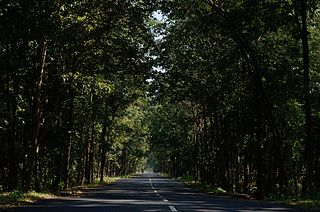Gram Panchayat is a basic governing institution in Indian villages. It is a political institution, acting as the cabinet of a village. The Gram Sabha works as the general body of the Gram Panchayat. The members of the gram panchayat are elected directly by the people. The president of a gram panchayat is known as a "Pradhan" or "Sarpanch". There are about 250,000 gram panchayats present in India.

Shivraj Singh Chouhan better known as Mamaji, is an Indian politician and member of the Bharatiya Janata Party. He served as 18th Chief Minister of Madhya Pradesh from 2020 to 2023 and previously from 2005 to 2018 and a Member of Legislative Assembly in Madhya Pradesh from Budhni since 2006 and previously from 1990 to 1991. He is the longest serving Chief Minister of Madhya Pradesh.
Mahatma Gandhi National Rural Employment Guarantee Act 2005 or MGNREGA, earlier known as the National Rural Employment Guarantee Act or NREGA, is an Indian social welfare measure that aims to guarantee the 'right to work'. This act was passed on 23 August 2005 and was implemented in February 2006 under the UPA government of Prime Minister Manmohan Singh following tabling of the bill in parliament by the Minister for Rural Development Raghuvansh Prasad Singh.
Panchayat samiti or block panchayat is a rural local government (panchayat) body at the intermediate tehsil (taluka/mandal) or block level in India. It works for the villages of the tehsil that together are called a development block. It has been said to be the "panchayat of panchayats".

Panchayati raj is the system of local self-government of villages in rural India as opposed to urban and suburban municipalities.

Social forestry is the management and protection of forests and afforestation of barren and deforested lands with the purpose of helping environmental, social and rural development. The term social forestry was first used in 1976 by The National Commission on Agriculture, when the government of India aimed to reduce pressure on forests by planting trees on all unused and fallow lands. It was intended as a democratic approach to forest conservation and usage, maximizing land utilization for multiple purposes.

Rajagopal P. V. is an Indian Gandhian activist, a former Vice Chairman of the New Delhi Gandhi Peace Foundation, and the president and founding member of Ekta Parishad. In 1972, Rajagopal started working alongside Gandhian activists J.P. Narayan and Subba Rao to disarm 578 bandits in the Chambal region of India. Thereafter, he stayed away from dealing with direct violence and focused on the people of Adivasis, bonded labourers, and other landless communities affected by poverty and exploitation.
Vijay Mahajan is the chief executive officer (CEO) of the Rajiv Gandhi Foundation and the director of the Rajiv Gandhi Institute of Contemporary Studies.
District is the most suitable administrative unit for decentralized planning below the state level as it possesses the required heterogeneity and is small enough to undertake people in planning and implementation and to improve productivity; district planning is an important tool.
Pimpri Gawali is a village in Parner taluka in Ahmednagar district of the state of Maharashtra, India.

Gram Vikas is an Indian non-governmental organisation based in Odisha, and founded in 1979. Gram Vikas works towards enabling rural communities to lead a dignified life. This is done by building capabilities of village communities, strengthening community institutions and mobilising resources. Gram Vikas works on six focus areas which are water, livelihoods, sanitation & hygiene, habitat & technologies, village institutions and education.

The Rajiv Gandhi Charitable Trust (RGCT) is a registered non-profit institution which was established in 2002 by the Indian National Congress. Named after the 6th Prime Minister of India, the trust is headed by the Interim President of the Indian National Congress.
The Mid-Himalayan Watershed Development Project (MHWDP) is a 222,951 ha land husbandry initiative in Himachal Pradesh, India, that aims by means of green growth and sustainable development to establish a functionally tenable watershed ecosystem. MHWDP has started to reverse several decades of degradation of the natural resource base including forests, has achieved improved agricultural yields and productivity, and has raised rural household incomes. It includes the Himachal Pradesh Reforestation Project (HPRF), the world's largest clean development mechanism (CDM) project.

The Provisions of the Panchayats Act, 1996 or PESA is a law enacted by the Government of India for ensuring self governance through traditional Gram Sabhas for people living in the Scheduled Areas of India. Scheduled Areas are areas identified by the Fifth Schedule of the Constitution of India. Scheduled Areas are found in ten states of India which have predominant population of tribal communities. The Scheduled Areas, were not covered by the 73rd Constitutional Amendment or Panchayati Raj Act of the Indian Constitution as provided in the Part IX of the Constitution. PESA was enacted on 24 December 1996 to extend the provisions of Part IX of the Constitution to Scheduled Areas, with certain exceptions and modifications. PESA sought to enable the Panchayats at appropriate levels and Gram Sabhas to implement a system of self-governance with respect to a number of issues such as customary resources, minor forest produce, minor minerals, minor water bodies, selection of beneficiaries, sanction of projects, and control over local institutions. PESA is an Act to provide for the extension of the provisions of Part IX of the Constitution relating to the Panchayats and the Scheduled Areas. PESA was viewed as a positive development for tribal communities in Scheduled Areas who had earlier suffered tremendously from engagement with modern development processes and from the operation of both colonial laws and statutes made in independent India. The loss of access to forest, land, and other community resources had increased their vulnerability. Rampant land acquisition and displacement due to development projects had led to large scale distress in tribal communities living in Scheduled Areas. PESA was seen as a panacea for many of these vulnerabilities and sought to introduce a new paradigm of development where the tribal communities in such Scheduled Areas were to decide by themselves the pace and priorities of their development.

BohaniHindi:[बोहानी] is a village located in the Gadarwara taluk in Narsinghpur district of the Jabalpur division in the Indian state of Madhya Pradesh.
Sansad Adarsh Gram Yojana is a rural development programme broadly focusing upon the development in the villages which includes social development, cultural development and spread motivation among the people on social mobilization of the village community. The programme was launched by the Prime Minister of India, Narendra Modi on the birth anniversary of Jayaprakash Narayan, on 11 October 2014.
Deen Dayal Antyodaya Yojana or DAY is one of the Government of India scheme for helping the poor by providing skill training. It replaces Aajeevik. The Government of India has provisioned ₹500 crore (US$63 million) for the scheme. The objective of the scheme is to train 0.5 million people in urban areas per annum from 2016. In rural areas the objective is to train 1 million people by 2017. Further, in urban areas, services like SHG promotion, training centres, vendors markets, and permanent shelters for homeless. The aim of the scheme is skill development of both rural and urban India as per requisite international standards.

Bhidauni is a village and Gram panchayat of two villages, Kewat Nagla and Bhidauni officially known as Bhidauni Bangar located between the Yamuna river and Yamuna Expressway in the Mat Tehsil of Mathura district, Uttar Pradesh, India. It is situated approximately 45 kilometers away from Mathura City, on the Raya Road connecting via Mant to Naujheel Road.
Block Pramukh is a term used in India to refer to the elected head of a Panchayat Samiti or Block Panchayat. The Panchayat samiti is a tier of the Panchayati raj system. It is a rural local government body at the Tehsil (block) level in India. It works for the villages of the tehsil that together are called a development block. The Panchayat Samiti is the link between the gram panchayat and the zila parishad. There are a number of variations in the name of this institution in the various states. For example, it is known as Kshetra Panchayat in Uttar Pradesh, Mandal Parishad in Andhra Pradesh, Taluka Panchayat in Gujarat, Block Panchayat in Kerala, and Mandal Panchayat in Karnataka.
The Government of India launched the Gareeb Kalyan Rojgar Abhiyaan (GKRA) initiative to tackle the impact of COVID-19 on shramik (migrant) workers in India. It is a rural public works scheme which was launched on 20 June 2020 with an initial funding of ₹50,000 crore. GKRA aims to give 125 days of employment to 670,000 migrant workers, approximately two-thirds of the total migrant labourer force that has gone back to rural areas. The scheme covers 116 districts in six states, Bihar, Uttar Pradesh, Madhya Pradesh, Rajasthan, Odisha and Jharkhand. The scheme is a joint effort by 12 different Ministries(Department of rural development, Department of Drinking water and sanitation, Ministry of Road Transport and Highway, Ministry of Panchayati Raj, Department of Telecommunication, Department of New and Renewable Energy, Ministry of Railways, Minisiry of Mines, Department of Agricultural Research and Education, Ministry of Environment, Forest and Climate Change, Ministry of Petroleum, Ministry of Defence) /Departments and covers 25 categories of works/ activities.








